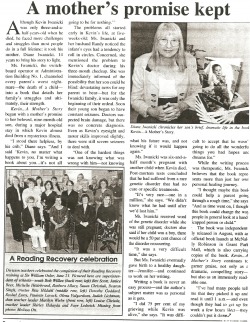Diane Iwaniki - Media Coverage
BOOK STRIKES A CHORD
Article by Jim Timlick - Wednesday, February 16, 2005
“A Mother’s Story”
When Diane Iwaniki refers to her late son Kevin as one in a million it’s something other than a case of maternal pride.
Kevin Iwaniki was just three and a half years old when his short, tragic life ended on Dec. 9, 1981.
Diane and Randy Iwaniki’s only son was born with Pelizaeus-Merzbacher disease, a rare, congenital disorder of the central nervous system. A so-called ‘one in a million’ disease, it strikes mostly boys and is characterized by blindness, seizures and developmental delays.
Some sufferers can live to be middle age or beyond. In more severe cases, sufferers are likely to succumb within a few years.
Kevin’s struggles, and those of his parents, are the subject of Kevin: A Mother’s Story, a book written and self-published by Diane Iwaniki. Released last summer, it recently went back to press for a second printing. Iwaniki, who lives in the Maples, was inspired to write the book while Kevin, who was just nine months at the time, clung to life in a hospital bed.
“I said to him no matter what happens I’m going to write a book,” she said. “I didn’t want all of this to be for naught.”
“I really had no aspirations to be a writer. It was just something I needed to do.”
Writing the book was no easy task. It was initially put on hold while Iwaniki helped raise the couple’s two daughters, Jennifer, 22, and Brittany, 16.
It then took nearly 13 years of pouring over reams of handwritten notes during coffee breaks and lunch hours and writing into the wee morning hours.
Part of Iwaniki’s motivation was the fact there were no books available that chronicled the plight of Pelizaeus-Merzbacher sufferers and their families.
By sharing her family’s story, she hoped to help others dealing with similar situations.
“I didn’t want it to be something flowery,” she says. “I wasn’t out to make him a hero. I just wanted to tell people what happened.”
Iwaniki says the toughest part of Kevin’s struggles was not knowing what was wrong.
At first doctors thought he might be visually-impaired. A long list of symptoms and diagnoses then followed.
It wasn’t until a biopsy was performed after his death that Pelizaeus-Merbacherwas confirmed.
“It was very frustrating,” Iwaniki says. “Not knowing was eating away at us.”
“If we had known what it was it would not have made it easier, but it would have at least allowed us to move on.”
Iwaniki says writing the book was cathartic for her. She is equally pleased about the impact it’s had on others.
“One woman who read the book said to me “It was like I was there the whole time with you,” Iwaniki says.
It made me feel like the book is doing something and struck a chord in people. It feels good knowing you are doing something and that it’s effective.
A Mother's Promise Kept

Although Kevin Iwaniki was only three and a half years old when he died, he faced more challenges and struggles than most people do in a full lifetime; it took his mother, Diane Iwaniki, 14 years to bring his story to light.
Ms. Iwaniki, the switchboard operator at Administration Building No. 1, channeled every parent’s worst nightmare – the death of a child – into a book that details her family’s struggles and ultimately, their strengths.
Kevin….A Mother’s Story began with a mother’s promise to her beloved nine month old son, during a major hospital stay in which Kevin almost died from a mysterious illness.
“I stood there helpless, by his crib,” Diane says. “And I said ‘Kevin, no matter what happens to you, I’m writing a book about you….it’s not all going to be or nothing.’”
The problems all started early in Kevin’s lie, at ive weeks old; Ms. Iwaniki and her husband Randy noticed the infant’s eyes had a tendency to roll in circles. Concerned, she mentioned the problem to Kevin’s doctor during his three month checkup. She was immediately informed of the possibility that her son could be blind: devastating news or any parent to bear – but for the Iwaniki family, it was only the beginning of their ordeal. Soon their young son began to have constant seizures. Doctors suspected brain damage, but there was no concrete diagnosis. Even as Kevin’s eyesight and motor skills improved slightly, there were still severe seizures to deal with.
“One of the hardest things was not knowing what was wrong with him – not knowing what his future was and not knowing If it would happen again.
Ms. Iwaniki was six and a half months pregnant with another child when Kevin died. Post mortem tests conclude that he had suffered from a rare genetic disorder that had no cure or specific treatments.
“It’s very rare – one in a million,” she says. We didn’t know what he had until after we’d lost him.”
Ms. Iwaniki received word of the genetic disorder while she was still pregnant; doctors also said if the child was a boy, there would be a 50% chance of the disorder reoccurring.
“It was a very difficult time,” she says.
But Ms. Iwaniki eventually gave birth to a healthy daughter – Jennifer – and continued working on her writing.
Writing a book is never an easy process – and the author’s subject matter was as personal as it gets.
“I did 75% of my grieving while Kevin was alive,” she says. “It was difficult to accept that he wasn’t going to do all the wonderful things you had hopes and dreams for.”
While the writing process was therapeutic, Ms. Iwaniki believes that the book represents more than just her own personal healing journey.
“I thought maybe this book could help a parent going through a rough time,” she says. “As time went on, I thought this book could change the way people look at a handicapped person or child.”
The book was independently released in August, with an official book launch at McNally Robinson in Grant Park mall, which is also carrying copies of the book. Kevin….A Mother’s Story continues to garner praise, not only as a dramatic, compelling story – but also as an immensely readable one.
“I’ve had many people tell me they picked it up and read it until 1 a.m. – and even though they had to get up for work a few hours later – they couldn’t put it down.”




